Monitor "OCV" parameter on scantool.


Different from the existing fixed cam phase angle type, CVVT(Continuously Variable Valve Timing) is the device which varies cam phase angle continuously to be optimum. And with engine oil pressure, it operates. CVVT consists of OCV(Oil Control Valve) and cam phaser. OCV, mounted on cylinder head, controlls the amount and direction of oil delivered to cam phaser by oil valve which is connected to a solenoid. Cam phaser, rotating cam phaser rotor with pressure and amount of oil produced by OCV, rotates cam shaft forcefully for or against the rotating direction and finally, cam shaft phase changes. With the appliance of CVVT, engine power,fuel efficiency and the quality of exhause gas are improved.
When PCM detects short to ground in OCV control circuit, ECM sets DTC P0076.
Item | Detecting Condition | Possible Cause |
DTC Strategy | ● Circuit continuity check, low | ● Poor connection ● Short to ground in control circuit ● OCV |
Enable Conditions | ||
Threshold Value | ● Short circuit to ground | |
Diagnostic Time | ● Continuous | |
MIL ON Condition | ● 2 driving cycle |
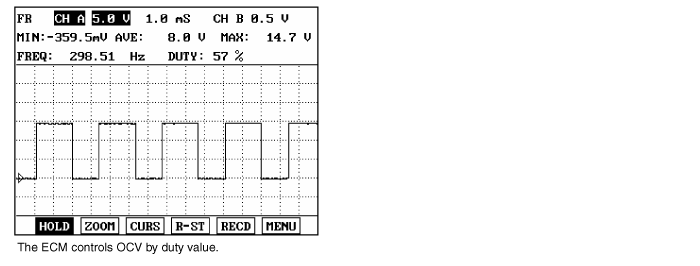
Temperature [℃(℉)] | Coil Resistance (Ω) |
20 (68) | 6.9 ~ 7.9 |
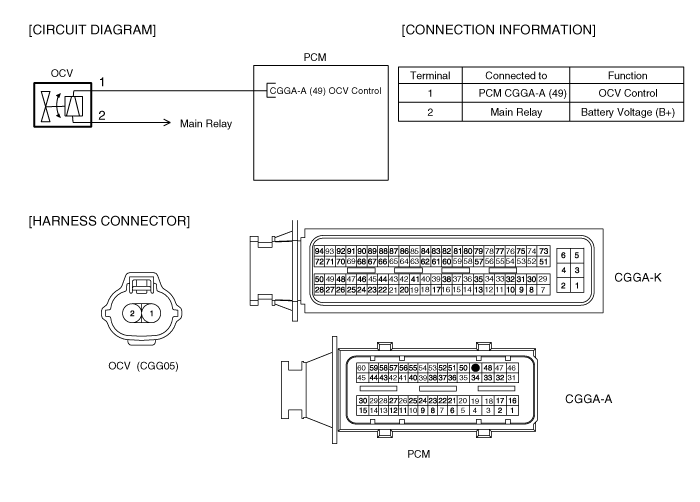
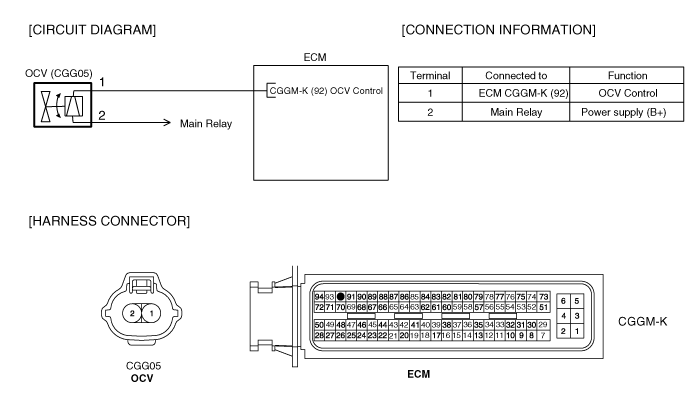
Connect scantool to DLC(Data Link Cable).
Warm up the engine to normal operating temperature.
Monitor "OCV" parameter on scantool.

Is the "OCV" data displayed correctly?

▶ Fault is intermittent caused by poor contact in the sensor’s and/or ECM’s connector or was repaired and ECM memory was not cleared. Thoroughly check connectors for looseness, poor connection, ending, corrosion, contamination, deterioration, or damage. Repair or replace as necessary and go to "Verification of Vehicle Repair" procedure.

▶ Go to "Terminal and Connector Inspection" procedure.
Many malfunctions in the electrical system are caused by poor harness and terminals. Faults can also be caused by interference from other electrical systems, and mechanical or chemical damage.
Thoroughly check connectors for looseness, poor connection, bending, corrosion, contamination, deterioration, or damage.
Has a problem been found?

▶ Repair as necessary and go to "Verification of vehicle Repair" procedure.

▶ Go to "Power Circuit Inspection" procedure.
IG "OFF".
Disconnect OCV connector.
IG "ON" & ENG "OFF"
Measure voltage between terminal 2 of OCV harness connector and chassis ground.
Specification : B+
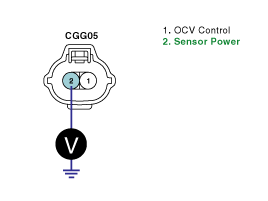
Is the measured voltage within specification?

▶ Go to "Control Circuit Inspection" procedure.

▶ Repair or replace as necessary and then, go to "Verification of Vehicle Repair" procedure.
IG "OFF".
Disconnect OCV connector.
IG "ON" & ENG "OFF"
Measure voltage between terminal 2 of OCV harness connector and chassis ground.
Specification : Approx. 3.2V
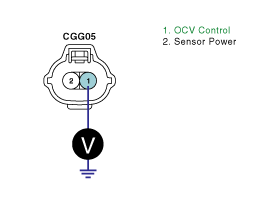
Is the measured voltage within specification?

▶ Go to "Component Inspection" procedure.

▶ Repair or replace as necessary and then, go to "Verification of Vehicle Repair" procedure.
Check OCV.
IG "OFF"
Disconnect OCV connector.
Measure resitance between terminal 1 and 2 of OCV connector.(Component Side)
Temperature [℃(℉)] | Coil Resistance (Ω) |
20 (68) | 6.9 ~ 7.9 |
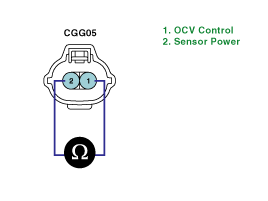
Is the measured resistance within specification ?

▶ Many malfunctions in the electrical system are caused by poor harness(es) and terminals. Faults can also be caused by interference from other electrical systems, and mechanical or chemical damage. So, check poor connections and the related circuit between ECM and component thoroughly. Repair as necessary and go to "Verification of Vehicle Repair" procedure.

▶ Substitute with a known - good OCV and check for proper operation.
▶ If the problem is corrected, replace OCV and go to "Verification of Vehicle Repair" procedure.
After a repair, it is essential to verify that the fault has been corrected.
Connect scan tool and select "Diagnostic Trouble Codes(DTCs)" mode.
Press F4(DTAL) and confirm that "DTC Readiness Flag" indicates "Complete".
If not, drive the vehicle within conditions noted in the freeze frame data or enable conditions.
Read "DTC Status" parameter.
Is parameter displayed "History(Not Present) fault"?

▶ System performing to specification at this time. Clear the DTC.

▶ Go to the applicable troubleshooting procedure.